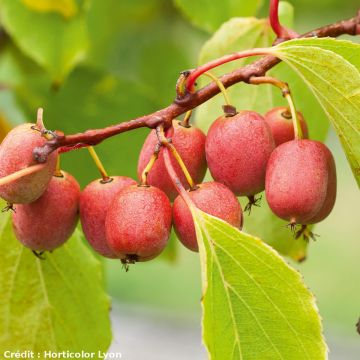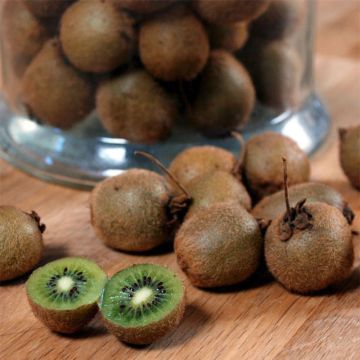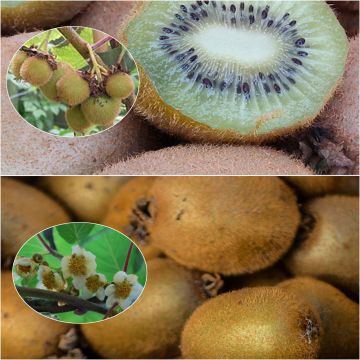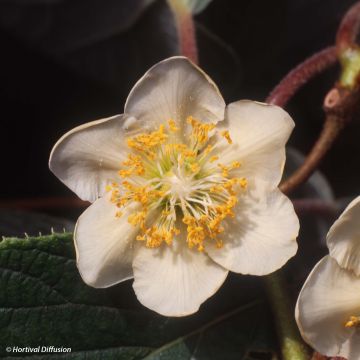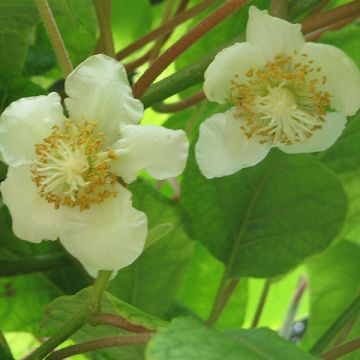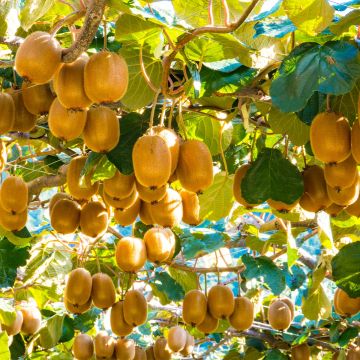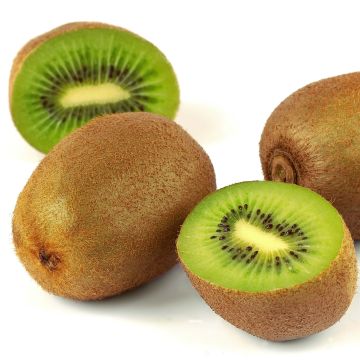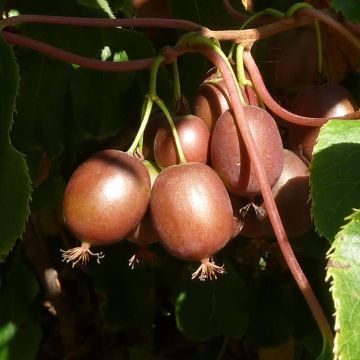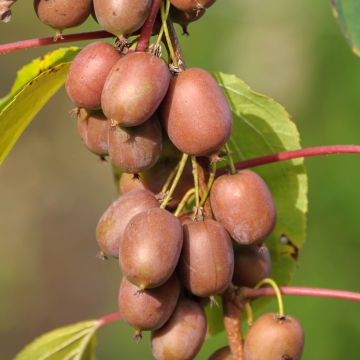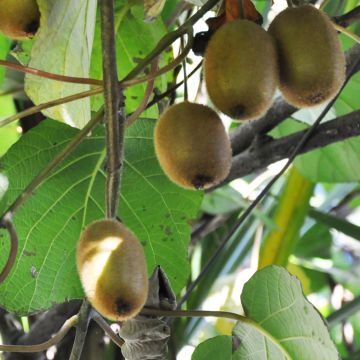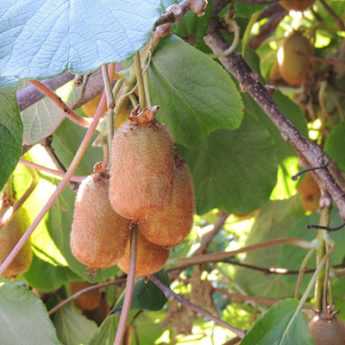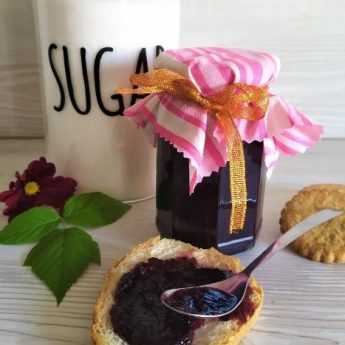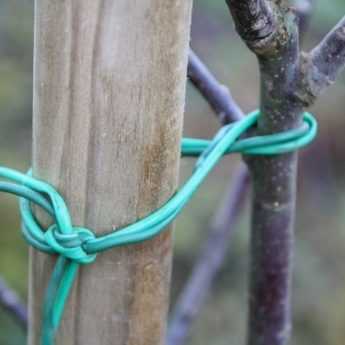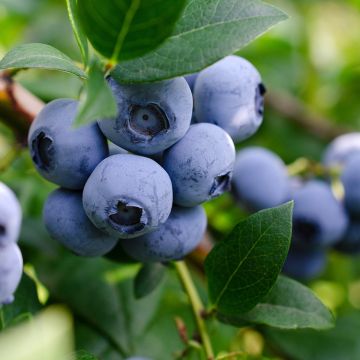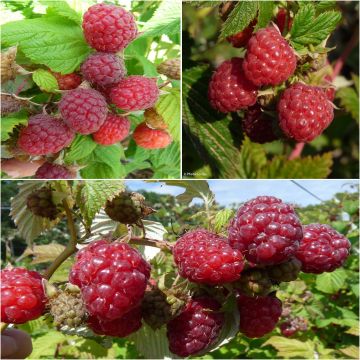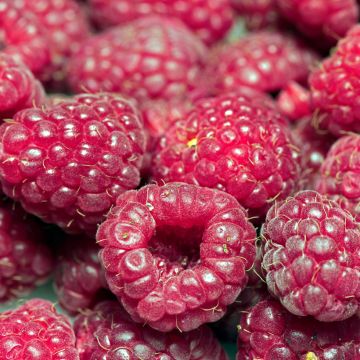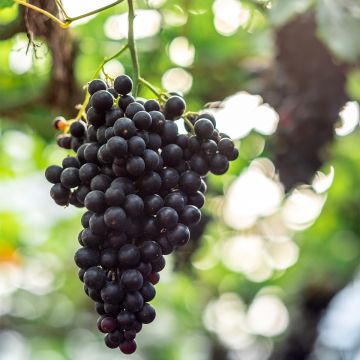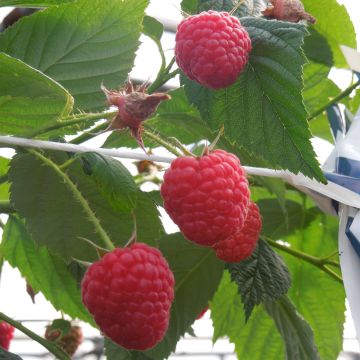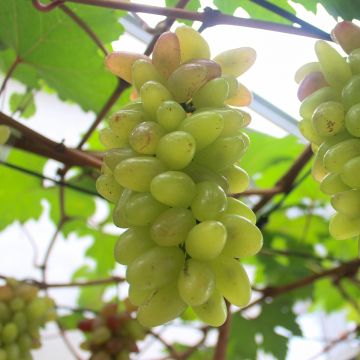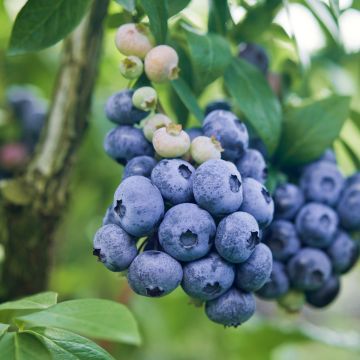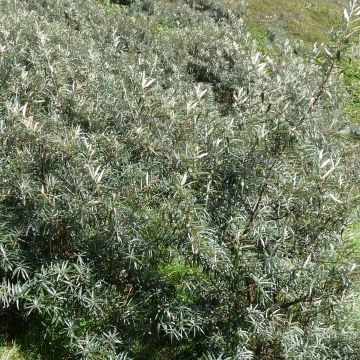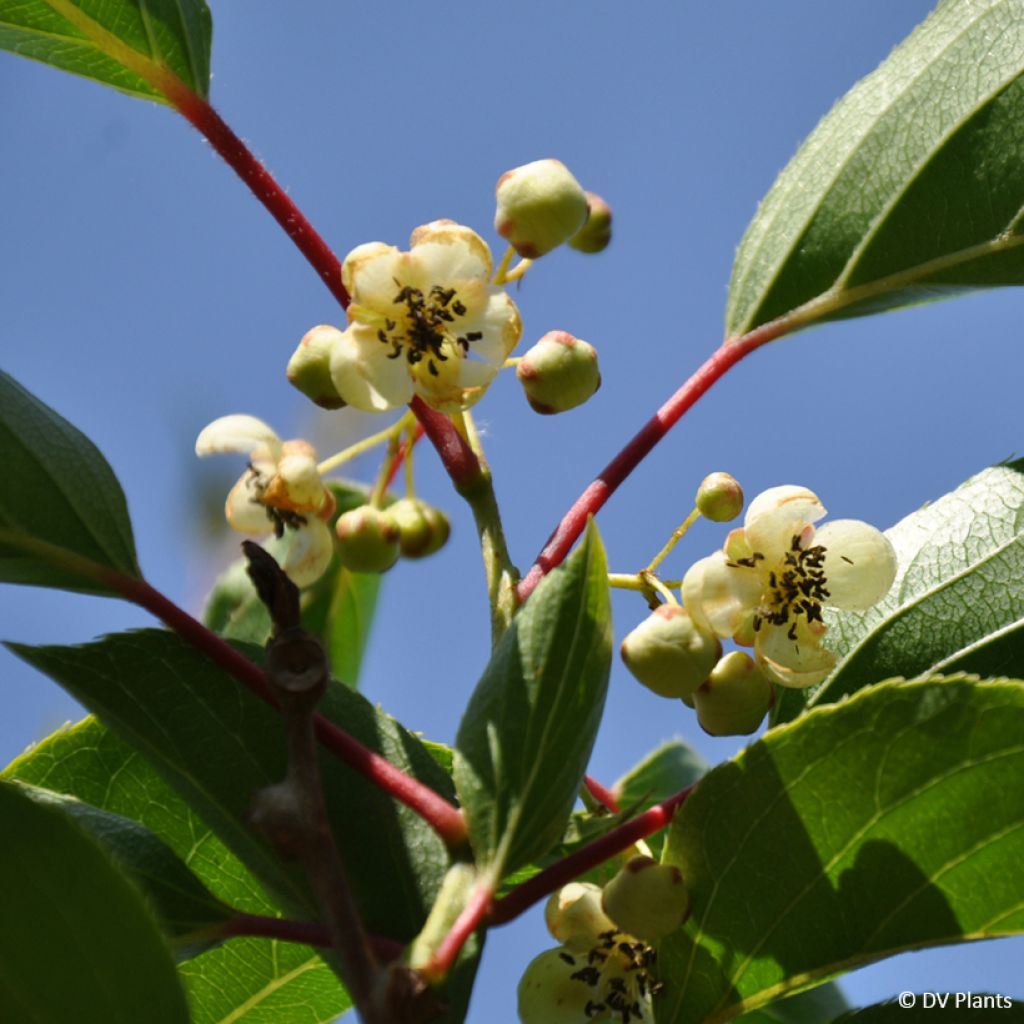

Hardy Kiwi Weima - Actinidia arguta
Hardy Kiwi Weima - Actinidia arguta
Actinidia arguta Weima
Hardy Kiwi, Tara Vine, Bower Vine, Kiwi Berry
Home or relay delivery (depending on size and destination)
Schedule delivery date,
and select date in basket
This plant carries a 6 months recovery warranty
More information
We guarantee the quality of our plants for a full growing cycle, and will replace at our expense any plant that fails to recover under normal climatic and planting conditions.
Description
The 'Weima' Kiwi is a male variety specifically designed to ensure the pollination of female Actinidia arguta plants. The plant does not produce fruit, but offers an abundant, highly fragrant white flowering in early summer, which will pollinate 4 to 6 female plants planted nearby. In addition to its role as a pollinator, this robust plant, with heart-shaped, vibrant green leaves and climbing stems, can enhance a pergola, trellis, or arbour. It is best to plant it in autumn, in fertile, moist, and non-chalky soil.
In the category of kiwis, are the Ornamental Kiwi (Actinidia kolomikta), the Kiwi (Actinidia chinensis or deliciosa) with fuzzy skin, and the Kiwai (Actinidia arguta) with smooth skin also known as Siberian Kiwi, Mini-kiwi, or Summer Kiwi. All three belong to the Actinidiaceae family. The Kiwai is native to Asia and produces long climbing branches that can reach 4 to 6 metres long. It is hardy to -20°C with deciduous foliage. The branches bear 8 to 10 cm long heart-shaped green leaves. In June-July, at the axil of the leaves, fragrant and nectar-rich, greenish-white flowers with purple anthers appear, grouped in threes.
Actinidia arguta 'Weima' is a male variety that develops vigorous vegetation reaching 3 to 4 metres high and 4 to 5 metres in spread. Its flowering occurs between May and June, allowing it to ensure the pollination of most other varieties of arguta kiwais. It does not produce fruit.
In arguta Kiwis, female plants have egg-shaped berries, smaller than kiwis (2 to 4 cm in diameter), with smooth and thin skin, with a similar taste to gooseberries. The kiwai is sweeter than traditional kiwi, with increased calcium and vitamin C content. Its flavour lends itself perfectly to nouvelle cuisine, enhancing fruit salads and creating sweet or savoury dishes. It is important to note that this variety is not self-fertile, it is a male plant that does not produce fruit but ensures the pollination of 5 to 6 female plants. It is perfect for pollinating varieties such as: Geneva, Ken's red, Scarlet September, Super Jumbo, Bingo, Ananasnaya, and many others.
In addition to its fruit qualities, its lush foliage, fragrant flowering, and generous branches provide the Kiwai with ornamental use and utility in the garden. This plant needs to be trained on a sturdy support such as wires stretched on a frame, a trellis, a pergola, an arbour, or a fence. It prefers light, moist, non-chalky soil and a sunny exposure.
Report an error about the product description
Hardy Kiwi Weima - Actinidia arguta in pictures
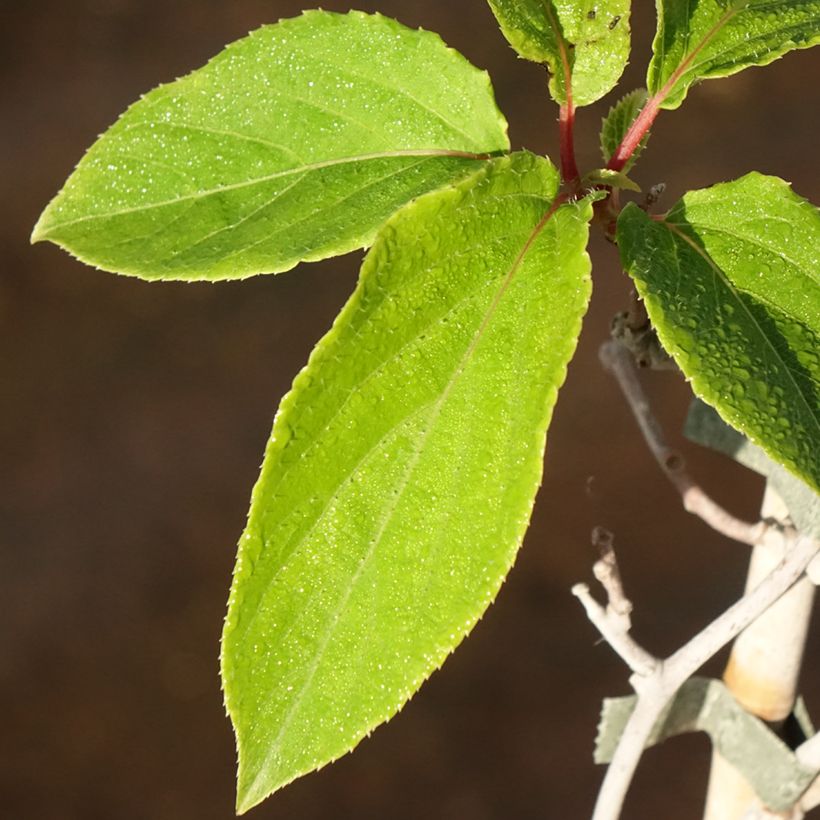

Plant habit
Flowering
Foliage
Botanical data
Actinidia
arguta
Weima
Actinidiaceae
Hardy Kiwi, Tara Vine, Bower Vine, Kiwi Berry
Cultivar or hybrid
Other Kiwi bush
View all →Planting and care
The 'Weima' kiwai should be planted in moist, rich, light and well-drained soil, the plant dislikes stagnant moisture, but also drought. Plant it in a sunny position sheltered from strong winds. Dig a hole 50 cm in all directions. Spread a layer of gravel in the bottom and then a layer of soil mixed with organic matter. Lay the root ball diagonally and bring the stems vertically along the support. Backfill with the same mixture. Provide support to help its twining branches climb. Add half a can of water. The kiwi has running roots, which develop horizontally below the surface of the soil. The soil must remain moist in summer, it is a good idea to mulch the base with a layer of 10 to 15 cm to prevent the germination of weeds and the evaporation of water from the surface of the soil.
This kiwai requires little maintenance, simply provide it with regular watering. In periods of high temperatures, water it 1 to 2 times a week. Once established and rooted, the plant manages on its own and becomes more drought-resistant. Apply a fertiliser rich in crushed horn at the start of vegetation. A special fruit tree fertiliser will also be very beneficial during the flowering period.
Actinidia arguta are not very susceptible to insects and pests but can be affected by red spiders in a hot and dry environment. To eliminate them, you can lightly and regularly spray water on the foliage and soil.
Planting period
Intended location
Care
Planting & care advice
This item has not been reviewed yet - be the first to leave a review about it.
Similar products
Haven't found what you were looking for?
Hardiness is the lowest winter temperature a plant can endure without suffering serious damage or even dying. However, hardiness is affected by location (a sheltered area, such as a patio), protection (winter cover) and soil type (hardiness is improved by well-drained soil).

Photo Sharing Terms & Conditions
In order to encourage gardeners to interact and share their experiences, Promesse de fleurs offers various media enabling content to be uploaded onto its Site - in particular via the ‘Photo sharing’ module.
The User agrees to refrain from:
- Posting any content that is illegal, prejudicial, insulting, racist, inciteful to hatred, revisionist, contrary to public decency, that infringes on privacy or on the privacy rights of third parties, in particular the publicity rights of persons and goods, intellectual property rights, or the right to privacy.
- Submitting content on behalf of a third party;
- Impersonate the identity of a third party and/or publish any personal information about a third party;
In general, the User undertakes to refrain from any unethical behaviour.
All Content (in particular text, comments, files, images, photos, videos, creative works, etc.), which may be subject to property or intellectual property rights, image or other private rights, shall remain the property of the User, subject to the limited rights granted by the terms of the licence granted by Promesse de fleurs as stated below. Users are at liberty to publish or not to publish such Content on the Site, notably via the ‘Photo Sharing’ facility, and accept that this Content shall be made public and freely accessible, notably on the Internet.
Users further acknowledge, undertake to have ,and guarantee that they hold all necessary rights and permissions to publish such material on the Site, in particular with regard to the legislation in force pertaining to any privacy, property, intellectual property, image, or contractual rights, or rights of any other nature. By publishing such Content on the Site, Users acknowledge accepting full liability as publishers of the Content within the meaning of the law, and grant Promesse de fleurs, free of charge, an inclusive, worldwide licence for the said Content for the entire duration of its publication, including all reproduction, representation, up/downloading, displaying, performing, transmission, and storage rights.
Users also grant permission for their name to be linked to the Content and accept that this link may not always be made available.
By engaging in posting material, Users consent to their Content becoming automatically accessible on the Internet, in particular on other sites and/or blogs and/or web pages of the Promesse de fleurs site, including in particular social pages and the Promesse de fleurs catalogue.
Users may secure the removal of entrusted content free of charge by issuing a simple request via our contact form.
The flowering period indicated on our website applies to countries and regions located in USDA zone 8 (France, the United Kingdom, Ireland, the Netherlands, etc.)
It will vary according to where you live:
- In zones 9 to 10 (Italy, Spain, Greece, etc.), flowering will occur about 2 to 4 weeks earlier.
- In zones 6 to 7 (Germany, Poland, Slovenia, and lower mountainous regions), flowering will be delayed by 2 to 3 weeks.
- In zone 5 (Central Europe, Scandinavia), blooming will be delayed by 3 to 5 weeks.
In temperate climates, pruning of spring-flowering shrubs (forsythia, spireas, etc.) should be done just after flowering.
Pruning of summer-flowering shrubs (Indian Lilac, Perovskia, etc.) can be done in winter or spring.
In cold regions as well as with frost-sensitive plants, avoid pruning too early when severe frosts may still occur.
The planting period indicated on our website applies to countries and regions located in USDA zone 8 (France, United Kingdom, Ireland, Netherlands).
It will vary according to where you live:
- In Mediterranean zones (Marseille, Madrid, Milan, etc.), autumn and winter are the best planting periods.
- In continental zones (Strasbourg, Munich, Vienna, etc.), delay planting by 2 to 3 weeks in spring and bring it forward by 2 to 4 weeks in autumn.
- In mountainous regions (the Alps, Pyrenees, Carpathians, etc.), it is best to plant in late spring (May-June) or late summer (August-September).
The harvesting period indicated on our website applies to countries and regions in USDA zone 8 (France, England, Ireland, the Netherlands).
In colder areas (Scandinavia, Poland, Austria...) fruit and vegetable harvests are likely to be delayed by 3-4 weeks.
In warmer areas (Italy, Spain, Greece, etc.), harvesting will probably take place earlier, depending on weather conditions.
The sowing periods indicated on our website apply to countries and regions within USDA Zone 8 (France, UK, Ireland, Netherlands).
In colder areas (Scandinavia, Poland, Austria...), delay any outdoor sowing by 3-4 weeks, or sow under glass.
In warmer climes (Italy, Spain, Greece, etc.), bring outdoor sowing forward by a few weeks.



































